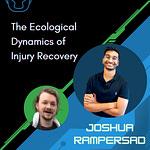To end season 2 with a bang, my guest today is Stuart Armstrong, who is well known in the sports science and skill acquisition community through his podcast, "The Talent Equation." Which is highly recommended. Stuart thinks of himself as a "pracademic" -- a practitioner with an academic background focused on the practical application of the science of coaching to real-life coaching. We've touched on the constraints-led approach to motor learning quite a bit throughout seasons 1 and 2, but only in a cursory sense. In this episode, Stuart walks us through more specific ways we can use the constraints-led approach to improve our martial arts training. One of the main breakthrough concepts here I want to direct your attention toward is that Stuart repositions skill development NOT as knowledge transfer from instructor to student but as an adaptation to environmental stress. In other words, skill is developed in sufficiently *representative* practice environments the same way that muscle grows in response to progressively heavier weight loads from session to session. But in the case of martial arts skills, the load is not weight but instead challenge to the perceptual system, i.e. your ability to read an opponent, manipulate distance, and properly time your attacks and counters. I'm extremely excited to share this interview with you. It's challenging, information-dense, and worthy of multiple listens -- which is why I saved it to cap off season 2. As always, if you're excited to jump in, hit the subscribe button on your podcatcher right now and enjoy the ride! P.S. The teaching article that I wrote, referenced in the show: https://www.maonrails.com/blog/how-an-ancient-greek-philosopher-can-help-you-make-killers-on-the-mat/ --- Join the Combat Learning Newsletter now: combatlearning.com/transfer --- Where to find Stuart Armstrong and check out his work! Website: https://www.thetalentequation.co.uk/ Twitter: https://twitter.com/stu_arm --- Thank you so much for listening! If you have any feedback, you can email me at josh@combatlearning.com or send me a message on facebook.com/combatlearning. If you got value from this episode, leave us a review on Apple Podcasts, Google Podcasts, or your favorite podcasting platform. So many shows pop up and fizzle out, and we're talking about stuff that almost nobody is talking about, so leaving us a review helps us a ton! Thanks in advance, and I'll see you on the next episode! --- Produced by Micah Peacock Outro Music: Synergy by Juche
"Repetition does not lead to skill": How to Apply the Constraints-led Approach to Teaching Martial Arts w/ Stuart Armstrong
Jun 28, 2021
Teaching Martial Arts by Combat Learning
Teach martial arts radically better using the ecological dynamics and constraints-led approach to training. Explore the little-known frontiers of skill adaptation, perceptual-motor learning, and performance science for combat sports such as jiu jitsu, taekwondo, kickboxing, karate, muay thai, and more.
Teach martial arts radically better using the ecological dynamics and constraints-led approach to training. Explore the little-known frontiers of skill adaptation, perceptual-motor learning, and performance science for combat sports such as jiu jitsu, taekwondo, kickboxing, karate, muay thai, and more.Listen on
Substack App
RSS Feed
Appears in episode
Recent Episodes











